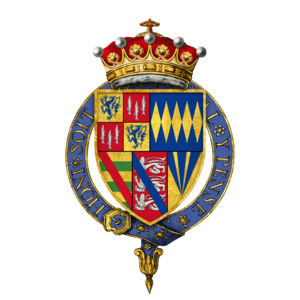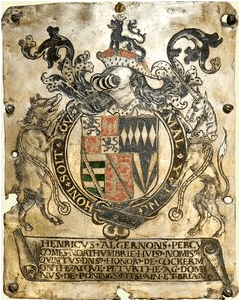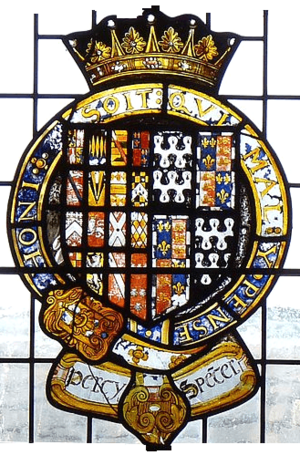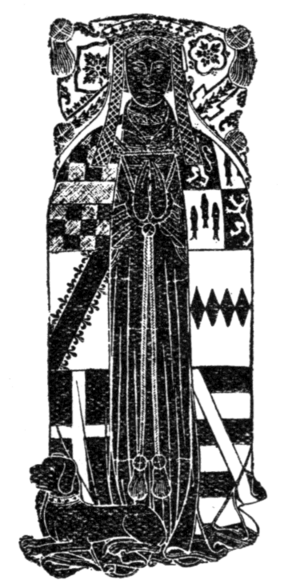Henry Percy, 5th Earl of Northumberland facts for kids
Quick facts for kids Henry Algernon Percy |
|
|---|---|
| Earl of Northumberland | |
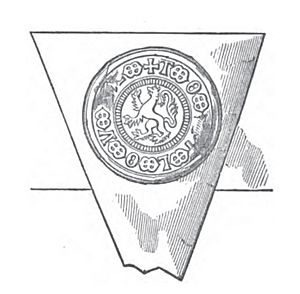 |
|
| Seal, 1515 | |
| Spouse(s) | Catherine Spencer |
| Issue | |
| Margaret Percy, Countess of Cumberland Henry Percy, 6th Earl of Northumberland Sir Thomas Percy Ingleram Percy William Percy |
|
| Noble family | Percy |
| Father | Henry Percy, 4th Earl of Northumberland |
| Mother | Maud Herbert |
| Born | 13 January 1477 Alnwick, Northumberland, England |
| Died | 19 May 1527 (aged 50) |
Henry Algernon Percy, 5th Earl of Northumberland (born 13 January 1477 – died 19 May 1527) was an important English nobleman. He was a member of the royal courts of both King Henry VII and his son, King Henry VIII.
Contents
Who Was Henry Algernon Percy?
Henry Algernon Percy was the son of Henry Percy, 4th Earl of Northumberland. His mother was Maud Herbert. She was the daughter of William Herbert, 1st Earl of Pembroke. Henry had a younger brother named Alan Percy. His sister was Eleanor Percy.
His Life and Career
Henry Algernon Percy grew up at the court of King Henry VII. This was a special place where important people lived and worked. On 28 April 1489, he became the 5th Earl of Northumberland after his father passed away.
He attended King Henry VII at the signing of the Treaty of Etaples in 1492. This was an agreement between England and France. In 1494, he took part in a big ceremony. This was when Prince Henry (who would later become King Henry VIII) was made a Knight of the Bath. This was a special honor given by the king. In 1495, Henry Algernon Percy became a Knight of the Garter. This is one of the highest honors in England.
In 1497, he served in the royal army. He fought against rebels from Cornwall at the Battle of Blackheath. After this, he took control of his family's many castles and lands.
Managing His Wealth
Henry Algernon Percy was a very rich nobleman. His yearly income was about £2,300. This was a huge amount of money back then! He spent a lot on his many servants and followers, about £1,500 a year. He also lived a very grand lifestyle. Because of this, he often found himself in debt.
A book called The Northumberland Household Book shows how he managed his large household. It describes the many different kinds of servants he had. This book is special because it's one of the few records like it from a non-royal family.
Important Roles
In 1501, he was given important jobs. He became the Constable of Knaresborough Castle. He was also the Steward of Knaresborough and Master Forester of Knaresborough Forest. He often served as a justice of the peace in different counties. This meant he helped keep law and order.
In 1503, he got a very important job. He became the warden of the east marches towards Scotland. This meant he was in charge of protecting the border with Scotland. One of his first duties was to escort Princess Margaret to Scotland. She was going to marry King James IV of Scotland. People said his splendid clothes and many servants impressed the princess.
Challenges and Later Life
Henry Algernon Percy sometimes had disagreements with the king. King Henry VII once fined him a large sum of money. This was because he had arranged a marriage for a young heiress without the king's permission. He paid half the fine before King Henry VII died. When Henry VIII became king in 1509, the new king cancelled the rest of the debt.
In 1513, he served in a war as a grand captain. He had a very large group of followers. He went to the siege of Thérouanne and fought at the Battle of the Spurs.
As Thomas Wolsey became more powerful, many important nobles had to follow his lead. Henry Algernon Percy was once briefly held in the Fleet Prison in 1516. This might have been so Wolsey could show his power. He was soon set free.
He was present at the famous Field of the Cloth of Gold in 1520. This was a grand meeting between King Henry VIII of England and King Francis I of France. It was a huge event with many celebrations.
In 1523, he led a raid into Scotland. He was falsely accused of using a royal symbol on his banner, but he easily proved his innocence. In 1525, he took part in a ceremony. This was for the creation of Henry Fitzroy. Henry Fitzroy was King Henry VIII's natural son.
Henry Algernon Percy died at Wressle Castle on 19 May 1527. He was buried at Beverley Minster.
Family Life
Henry Algernon Percy married Catherine Spencer. She was the daughter of Sir Robert Spencer. Catherine's mother was Eleanor Beaufort. Henry and Catherine had three sons and two daughters:
- Henry Percy, 6th Earl of Northumberland (1502–1537), who was their oldest son and inherited his father's title.
- Sir Thomas Percy (c. 1504 – 1537). He was involved in a rebellion called the Pilgrimage of Grace.
- Sir Ingelram Percy (c. 1506–1538). He also took part in the Pilgrimage of Grace.
- Lady Margaret Percy (c. 1500/1502–1540). She married Henry Clifford, 1st Earl of Cumberland. Her special brass memorial can still be seen in Skipton Parish Church.
- Maud Percy.
His Legacy
Henry Algernon Percy loved grand things. He was one of the richest nobles of his time. He had a very large household and enjoyed building. He also supported the poet John Skelton. Skelton wrote a poem about Henry's father.
 | Valerie Thomas |
 | Frederick McKinley Jones |
 | George Edward Alcorn Jr. |
 | Thomas Mensah |


